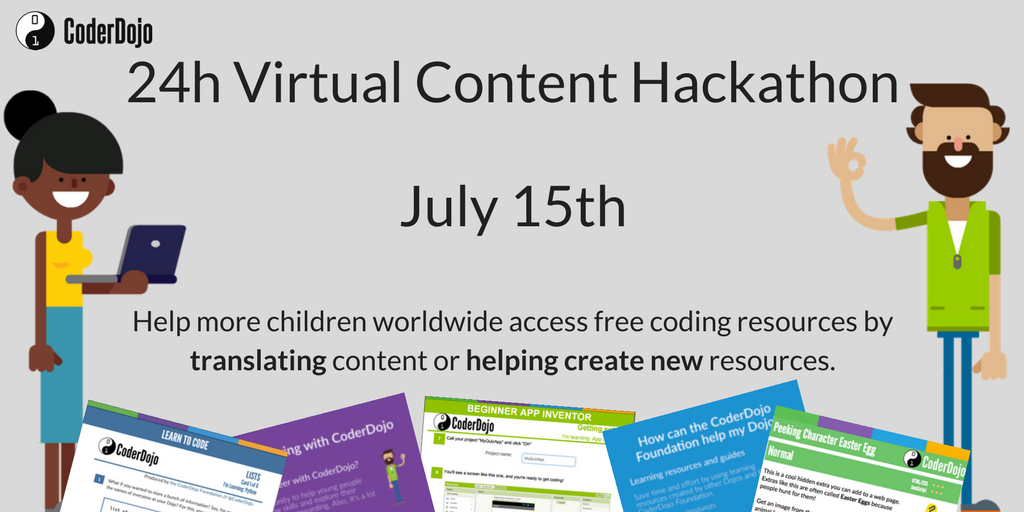
26th July 2017
Outcomes of our first online content hackathon
On Saturday July 15th, a group of CoderDojo community members gave up hours of their time to help translate and create educational content for a variety of topics into many different languages. We’d like to thank everyone who took part for their efforts and their time. In this post I’ll be walking through what we achieved, what we learned, and where we’re going next with our efforts to have organised content events like this.
What we achieved
First, the cool stuff! We translated and created a whole bunch of materials and it’s going to take me a little while to process everything and get it released. I’ve created this table to track everything and will be lighting up the releases as we get them.
EnglishFrenchJapaneseLatvianPortugueseRomanianSpanish Created: JavaScript—Making Change Challenge Card [Live Beta]Beginner Scratch Sushi Cards[78% complete]Beginner HTML/CSS Sushi Cards
[Live]3 Promotional Flyers for Dojos [Live]2 Promotional Flyers for Dojos [Live]Beginner Scratch Sushi Cards
[Complete]Intermediate Scratch Sushi Cards
[Live] Created: Python—Text Based Adventure Challenge Card [Complete]Beginner HTML/CSS Sushi Cards
[Code samples]Beginner Scratch Sushi Cards
[40% complete]Beginner Scratch Sushi Cards
[37% complete]Intermediate Scratch Sushi Cards
[Complete]Beginner Scratch Sushi Cards
[48% complete] Created: Python—River Crossing Challenge Card [Created]Game Design Sushi Cards
[17% complete]3 Promotional Flyers for Dojos [Live] 2 Promotional Flyers for Dojos [Live]Beginner HTML/CSS Sushi Cards
[25% complete]
You can see we’ve already got the first few pieces of our translated content live, along with one of the creations of our English-speaking content creators. You can also see that there are a lot of partially-complete translations, which we can tackle in the next content hackathon!
What we learned
We learned a lot from running this first online content hackathon. Here’s what’s good, what needs work and what’s just plain interesting:
Good
It was fun!
Everyone I’ve heard from who took part enjoyed the experience—I know I did!
Working in groups helps
Some people participating in the hackathon, notably the group from CoderDojo Japan, got together in the same place and made an event of it. This looked like it added to the fun and made it easier to coordinate tasks between the group members. I’ll try to make it easier to find people near you and form groups like this next time.
We want to do it again
Most of the respondents to my post-hackathon survey are interested in participating in another hackathon in future. The consensus seems to be a quarterly event. For more details on the next one, see below!
Interesting
3 hours is the sweet spot
While some of you could only spare an hour and one or two of you joined me for the full twenty-four, most hackathon participants had around three hours of time to give. This is something we’ll take into account in our planning when thinking about the size and breakdown of tasks.
Japan starts at 06:00
Luckily, this is around when I wake up anyway, most days! Really, though, the point is to think more about timezones. It means that our somewhat arbitrary 12:00 starting time probably needs to be reconsidered next time and something more suitable to the actual breakdown of volunteers chosen. Now we have the data to estimate what timezones those volunteers will be in though!
Needs work
Clarity and timeliness of help/instruction materials
The hackathon grew rapidly close to the actual date, so there was a sudden increase in the quantity of tasks and supporting documentation needed for those tasks, making the whole process a bit rushed. Next time, we’ll assume it’ll be big from the start!
Registration process
Since this was the first time we’ve done an event like this, the process for getting involved was very manual and relied on Google Forms and me sending volunteers an email, which often had a bit of a delay in between. We’ll have a faster system for responding next time.
Task tracking
Task tracking was likewise very manual and could have worked better. Not everyone could make it on the day and this led to gaps in what got completed. A good example of where a better task tracking and sign-in system would have helped is the Spanish Scratch Sushi Cards—we should probably have completed the Beginner level before translating Intermediate! Another piece of feedback we got is that it would have been nice to be able to see what other people were working on and how much progress the hackathon as a whole was making. We’ll work on improving both of these for next time.
Next time
While plans for the next content hackathon are still at an early stage, right now I intend to release sign-ups in September, do some planning among signed-up volunteers (forming groups, dividing work, etc.) in October and actually run the event in November. I hope to see all our participants from this time around and a whole bunch of new ones involved then!
